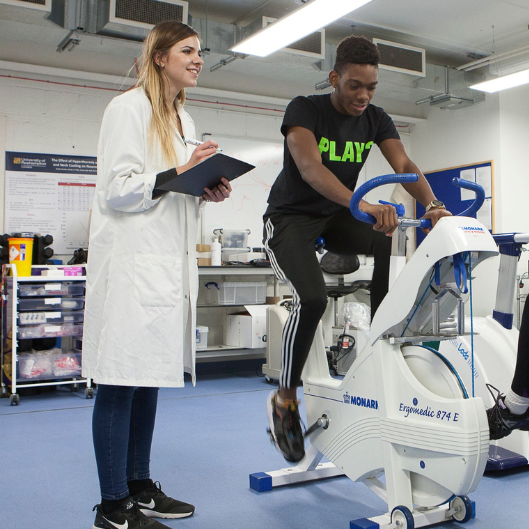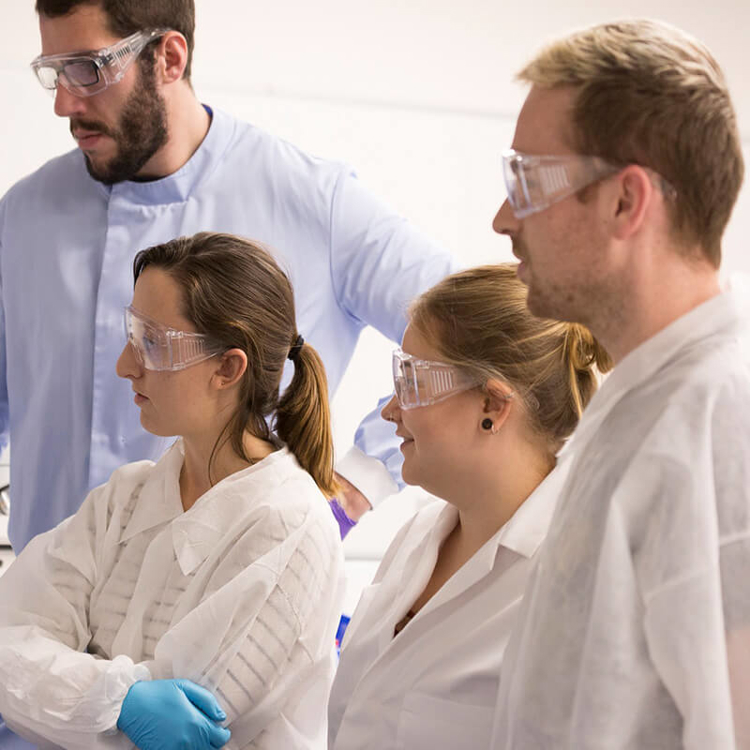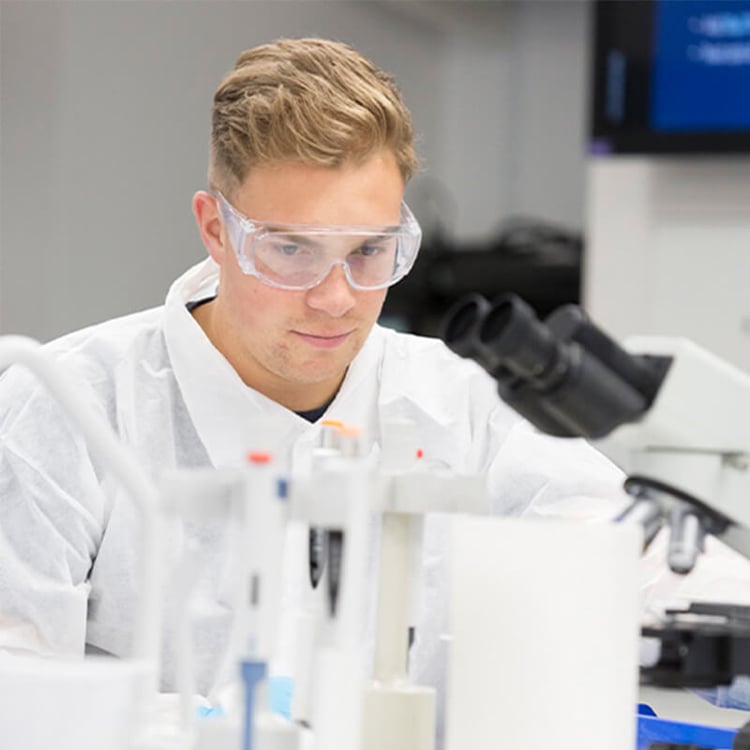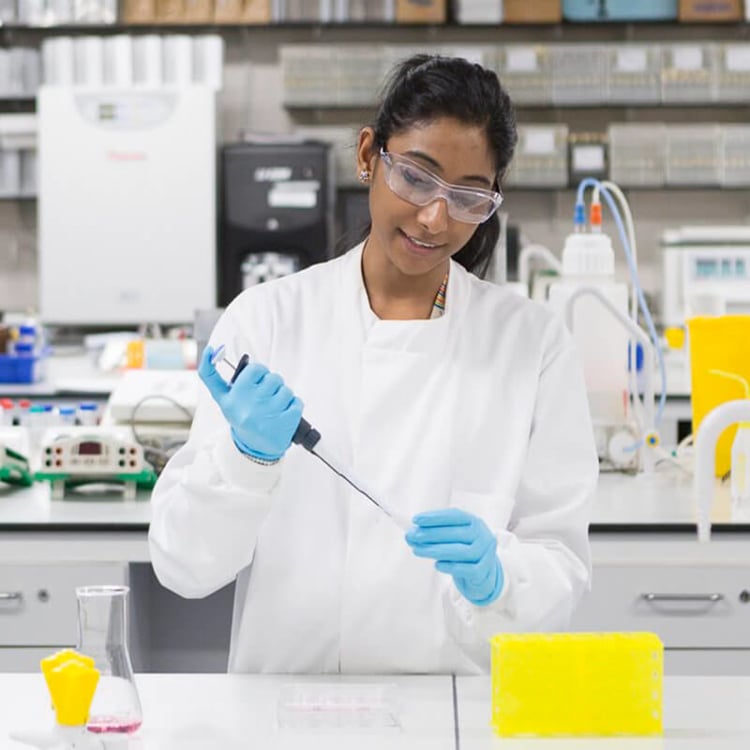/ Postgraduate Taught /
Start date:
September 2025
Duration:
1 year (full-time)
Number of credits:
180

Postgraduate, Master's and Doctoral On Campus Open Day
Saturday 10 May 2025
Unlock advanced research opportunities in a multi-disciplinary focussed programme designed to propel you into high-demand roles in academia and industry R&D, leveraging international premier research institutions and innovation hubs.
Did you know
Our MRes Applied Science course offers a variety of pathways you can pursue, even if your bachelor's degree was not entirely related to pathways (subject to agreement), allowing you to explore new disciplines and broaden your expertise including:
- Cell Medicine
- Nutrition and Metabolic Disorders
- Sport and Exercise Science
- Healthcare
- Conservation and Biodiversity
Modules
Module details: In this module, you will develop critical thinking skills to interpret healthcare research effectively and apply it in nutrition practice. You will collect body composition data using methods commonly employed in healthcare settings, conduct data analysis, and evaluate the strengths and limitations of these techniques. This module will enhance your ability to assess research critically and apply data-driven insights to nutritional practice, preparing you for evidence-based decision-making in clinical and healthcare environments.
Module details: In this module, students will gain hands-on experience in designing, planning, and executing a research project. By engaging in first-hand original research and data collection, students will have the opportunity to apply the knowledge they’ve developed throughout the programme. With individual supervision, they will learn how to acquire and analyse experimental data, becoming proficient in relevant laboratory techniques used in both basic and applied research. The module covers a range of specialised pathways, each offering unique research topics. Here are examples of the topics covered in each pathway:
Cell and Molecular Medicine Pathway: Cellular and molecular mechanisms of cancer; microbial resistance to antibiotics; immune mechanisms of disease; stem cell research; molecular modelling in cell biomedicine.
Nutrition and Metabolic Disorders Pathway: Endocrine regulation of appetite; polycystic ovary syndrome; diet, nutrition, and the microbiota; beta cell function and survival; the effects of diet and meal timing on obesity and metabolic rate; polyphenols and cardiovascular disease.
Sport and Exercise Science Pathway: Optimisation of human performance and health in heat through acute (e.g., cooling) and chronic (e.g., acclimation) strategies; metabolic demands during exercise under different environmental conditions.
Healthcare Pathway: Public health interventions for improving diet and lifestyle in specific social groups; studies on perceived stress and sleep quality across different social or professional groups.
Optional according to pathway
Module details: The Independent Study module enables in-depth, tutor-supported study of a chosen topic within the field of Cell and Molecular Medicine. Delivered mainly face-to-face, it includes lectures, seminars, and research involvement. Students access learning resources and personalised feedback, helping them refine their skills and deepen their understanding of the subject matter.
Module details: The Independent Study module enables in-depth, tutor-supported study of a chosen topic within the field of Cell and Molecular Medicine. Delivered mainly face-to-face, it includes lectures, seminars, and research involvement. Students access learning resources and personalised feedback, helping them refine their skills and deepen their understanding of the subject matter.
Module details: The Independent Study module enables in-depth, tutor-supported study of a chosen topic within the field of Cell and Molecular Medicine. Delivered mainly face-to-face, it includes lectures, seminars, and research involvement. Students access learning resources and personalised feedback, helping them refine their skills and deepen their understanding of the subject matter.
Module details: In this module, you will study approaches to address the growing global burden of neurological diseases, focusing on individual, national, and international perspectives. You will explore biopsychology, neurology, and lifestyle medicine, with an emphasis on preventative strategies in clinical neuroscience. The module will also consider health inequities, cultural perspectives, and the “lived experience” of patients in research design and implementation.
Module details: In this module, you will explore obesity and related cardiometabolic diseases, examining the underlying mechanisms that govern eating behaviour from both physiological and psychological perspectives. You will consider how these mechanisms can be targeted for prevention and treatment. Additionally, you will develop communication skills to effectively engage with different audiences. This module will provide you with a comprehensive understanding of obesity-related health challenges and equip you with strategies to address them through evidence-based interventions and effective communication.
These modules are those we currently offer and may be subject to change.
Explore a specialised scientific pathway
This programme allows you to tailor your studies to your interests, background, and career goals, providing the flexibility to deepen your expertise or explore a new discipline.
With a strong research focus, this programme offers a range of specialised pathways to equip you with advanced scientific knowledge and skills. It is ideal for those interested in subsequently pursuing a PhD.
Explore cutting-edge research in cellular therapies and regenerative medicine within the field of biomedical science.
Study ecosystem preservation and the impact of human activity on wildlife.
Develop innovations and solutions to improve patient care and medical practice.
Investigate the science behind nutrition, metabolism, and disease prevention.
Advance your knowledge of human performance, biomechanics, and sports physiology.
Even if your bachelor's degree is not directly related, you may still be eligible to pursue a new pathway (subject to agreement).

Skills
Prepare to contribute to advancements in scientific research and practice.
Discover advanced research whilst conducting rigorous research in clinical and biological science with an emphasis on cutting-edge methodologies.
On this course, you will learn a wide range of skills across various scientific disciplines whilst developing field-specific knowledge within your chosen pathway.
You will also learn a range of critical thinking and analytical skills which will enhance your ability to critically evaluate research, interpret data and apply findings in scientific contexts.
This course offers the opportunity to learn a number of transferable research skills you will be able to apply to your future career including:
- Grant application
- Ethical research practices
- Statistical analysis
- Effective and Ethical use of generative artificial intelligence for research
- A variety of conventional and nonconventional ways for research dissemination
- Collaborative and interdisciplinary learning.
Learning
Blended learning approach combines traditional lectures with hands-on, real-world application.
The programme’s research-active faculty provide students with practical learning opportunities, culminating in a student conference where they present their findings to industry professionals.
Students engage in individual or group research projects under academic supervision, allowing for in-depth exploration of specific topics with an emphasis on rigorous, methodologically sound research.
The programme also offers industry engagement through a student conference and collaborative projects with external partners, providing invaluable real-world experience across various fields.
Each student benefits from personalised mentorship by a primary supervisor and has access to advanced facilities and technical support to assist with their research.


Assessment
Discover your future career path through real-world assignments.
Throughout the course, you will take part in various assessments designed to enhance and evaluate your understanding and practical skills, including:
- critical analysis reports
- oral presentations
- paper critiques
- written assignments
- scientific debates
- meta-analysis
You will graduate from Roehampton with an in-depth understanding of both the theory and hands-on application in your chosen path, ready to take the next step into your future career.
Careers
Shape the future of applied sciences
Upon graduation, you will be fully prepared to take on a wide range of careers in academia, government, or industry.
Graduates can take on roles developing new products and technologies as research scientists in universities, research institutes, and laboratories, including:
- Pharmaceuticals
- Biotechnology
- Nutrition
- Healthcare science
- Environmental agencies
Many graduates pursue may opt for further studies, aiming for a PhD to deepen their expertise and engage in advanced research.

Open days
Get a real taste of our campus, community and what it’s like to study at Roehampton
Applying
Full-time UK postgraduate students apply through our direct application system.
Course subject to curriculum review and validation.
Specific entry requirements
At least a 2:2 honours degree or international equivalent with overall 60% or above related to life sciences.
General entry requirements
September 2025 entry tuition fees (UK)
| Level of study | Full-time |
| MRes | £9,250 |
We offer a wide range of scholarships and bursaries. See our financial support pages for UK students.
We also provide other ways to support the cost of living, including free buses and on-campus car parking, hardship support and some of the most affordable student accommodation and catering in London. Find out more about how we can support you.
International undergraduate students apply through our direct application system.
Course subject to curriculum review and validation. [REMOVE IF NOT NEEDED]
Specific entry requirements
International students will need to apply to the Foreign and Commonwealth Office (FCO) for clearance from the Academic Technology Approval Scheme (ATAS) in order to study this course.
You will also need to attend a short interview to ascertain your suitability and commitment for this highly research-led programme.
General entry requirements
September 2025 entry tuition fees (international)
| Level of study | Full-time |
| MRes | £18,250 |
We offer a wide range of scholarships and bursaries. See our financial support pages for international students.
We also provide other ways to support the cost of living, including free buses and on-campus car parking, hardship support and some of the most affordable student accommodation and catering in London. Find out more about how we can support you.






